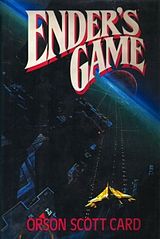 | Very briefly, the story is: in the far future humans encounter an alien insect-like race and they go to war. On Earth, children are bred to be soldiers and officers in the war. One such child is Andrew "Ender" Wiggin and he is chosen to go to Command School. At Command School he undergoes extensive game-like training programs and ends up playing a significant role in the war while still a child. |
Why, then, is this book so amazing? The author does an excellent job plotting; there are some fabulous plot twists, particularly at the end of the book. The author also does an excellent job characterizing Ender, the smart misfit. Card really puts the reader inside Ender's head. We're right there as he's bullied, has to fight for his life, wins and loses games, etc. This is the very essence of fiction: making the reader understand what it's like to be someone else. Moreover, for many bullied or misfit kids it was comforting to know they weren't alone in their experiences.
This novel also deals with bigger questions. The kids behave the way kids really behave rather than how adults wished they behaved; this was eye-opening for some adult readers. It also makes one think about the whole concept of war and genocide. Is war ever justified? Is genocide? What if your whole world was at risk? Perhaps most significantly it addresses the issue of good and evil within each of us. The very best fiction addresses such big picture ideas.
As a geek, I also enjoyed the shout-outs to other works. In particular, the anonymous military leaders who discuss their plans at the beginning of the chapters is very reminiscent of the Second Foundationers in Isaac Asimov's Foundation trilogy. Alluding to previous works of fiction makes a novel richer.
The take-home messages are:
- When reading, think about what you're reading. What works? What doesn't work?
- When writing, think about what you're writing. What works? What doesn't work? How can you write really effective characterizations to put the reader in your character's head? Can you add fabulous plot twists? How can you address big picture ideas in your fiction? How can you allude to other fiction?
Good luck with your writing!




3 comments:
From the description it seem quite great information about reading and writing. Definitely I will order this book to get exciting facts about reading and writing. Thank you for sharing.
Superb piece of writing I am glad I to read about articles marketing yes future is here.
Thank you for sharing this "Writing on Reading: Ender's Game" blog. My service is website content writing services
Post a Comment